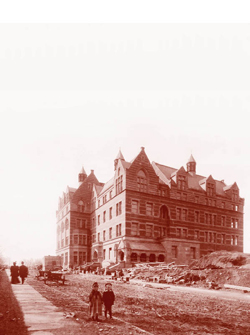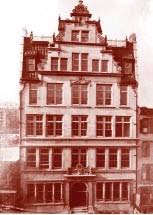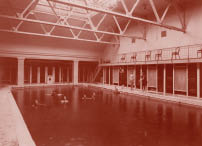Points of Contact
TC's urban legacy is one of constant engagement, in which the College learns as much as it teaches
The refurbishing of the swimming pool in Thompson Hall in 2008 was hardly a landmark in Teachers College’s history. Yet it renewed a century-old connection between the College and the city.
“We’ve had people from the community coming here for years,” says Maria Hataier, Director of Student Activities and Programs, whose office operates the Aquatic Center, as it is formally known. “Their kids used the pool, their grandkids are now coming here, and they all have great stories.”
The pool is just one symbol of TC’s broader involvement with New York and cities in general—an embodiment of John Dewey’s notion that, “the learning in school should be continuous with that out of school” and that, “this is possible only when there are numerous points of contact between the social interests of the one and the other.”
Dewey’s vision has been realized by the countless educators TC has produced over the years, who have shaped entire school systems while frequently returning to the College for advanced degrees or even to join the faculty. And not just educators, but also human resource managers, education economists, school psychologists, executive coaches and more.
Many of these professions were represented at one of the College’s first “points of contact”—the Speyer School, founded by the College and St. Mary’s Episcopal Church in 1902 on West 126th Street. Created as an outgrowth of the church’s “free kindergarten,” Speyer, according to its first principal, “sought to do what can be done, under the conditions of crowded city life, to provide some of the first essentials of wholesome living.”
Speyer included health and sanitation in the curriculum, which, at the time, was not part of public schooling; opened its library’s doors to the lower middle-class neighborhood, providing a space for community clubs to gather; and maintained a staff that included two social workers.
Another point of contact was the Lincoln Experimental School, founded in 1917, where first graders studied community life by building a play city, sixth graders printed and published a magazine, and eighth graders explored the workings of a heating apparatus. The Lincoln School faculty, who were also faculty of TC, published prodigiously, developed and field-tested curricula and helped to overhaul school systems in Pittsburgh, Denver, Cleveland, Baltimore, Rochester, Chicago and St. Louis.
The field of urban education had its formal birth at TC,in the early 1960s, largely through the efforts of A. Harry Passow, who taught at the College for nearly 40 years before retiring in 1991 as the Jacob H. Schiff Professor Emeritus. In 1962, Passow chaired a two-week Conference on Curriculum and Teaching in Depressed Urban Areas. The event, held at TC, produced the landmark Education in Depressed Areas, edited by Passow and published by Teachers College Press, which is considered one of the early bibles on the teaching of urban, disadvantaged youth. At the invitation of the Washington, D.C., Superintendent of Schools, Carl Hansen, Passow and a team of nearly 100 researchers conducted an 18-month study of the capital’s dysfunctional K–12 education system. The result was the far-reaching and controversial analysis, “Toward Creating a Model Urban School System: A Study of the Washington, D.C., Public Schools.” A federal judge later cited the report in ruling that Washington’s tracking system was unconstitutional, arguing that it resulted “in de facto segregation.”
Passow served under the College’s sixth president, John H. Fischer, who, as superintendent of Baltimore City Schools, had become the first big-city schools chief to enforce the 1954 U.S. Supreme Court decision striking down segregation. When Fischer, who died this past winter at 99, learned that some white parents would be keeping their children home, he ordered all absent pupils marked truant. Baltimore desegregated largely without mishap, and Fischer received the Hollander Award for Contribution to Racial Relations.
One of Fischer’s top priorities as TC’s President was to give greater attention to problems in urban education—specifically to those of inner-city schools in New York. During his tenure, TC established the Institute for Urban and Minority Education (IUME), and Fischer himself served as member and chair of the National Commission on the Education of the Disadvantaged and the National Advisory Commission on Education of Disadvantaged Children. He also was a major supporter of TC’s work in building an education system in Afghanistan, regularly visiting Kabul.
But it was IUME’s founder, the psychologist and TC alumnus Edmund W. Gordon—now Richard March Hoe Professor Emeritus of Psychology and Education—who brought the College into a new relationship with its core community of Harlem. An African American born in the segregated South to a father who was a physician and a mother who was a school teacher, Gordon was an architect of the federal Head Start Program and also a major contributor to the Coleman Report, published in 1966, which first established that children’s home lives and socioeconomic circumstances are more powerful determinants of their educational attainment than school-related factors.
Gordon has been a lifelong advocate of supplementary education—the idea that disadvantaged children must be provided with the exposure to literature, art, mentoring by adults, psychological and medical health services, and other care that middle class children typically enjoy
During the 1950s, together with his wife, Susan, a physician, Gordon—then a practicing minister whose church had assigned him to work with Harlem street gangs—founded the Harriet Tubman Clinic in Harlem, which provided health and guidance services for children. In 1973, through a partnership between TC and the Educational Testing Service, where he then held a joint appointment, Gordon launched IUME, which ever since has conducted research on the needs of disadvantaged communities. In 2007, the College formally opened its Edmund W. Gordon Campus, located in the former Hotel Theresa on 125th Street and Adam Clayton Powell Boulevard.
TC has blazed a parallel path in special education. Ignacy Goldberg, a faculty member who led many organizations focused on mental retardation, argued forcefully that mentally challenged children could achieve academically. Subsequently he helped lead the fight to de-institutionalize children with mental retardation.
Another faculty member, Frances Connor, served as President of the Council for Exceptional Children, the first chapter of which was initially located at TC. She was instrumental in bringing significant government funding to the College for research on the needs of physically handicapped children.
Building on their work, Leonard Blackman, now Professor Emeritus of Psychology and Education, won government funding in special education that led to the construction of Thorndike Hall in the late 1960s and the establishment, under Blackman’s direction, of the nation’s first comprehensive Research and Demonstration Center for the Handicapped. Blackman did pioneering work on the central role of memory in learning to read. He also hired a young faculty member and former musician, R. Douglas Greer, who would go on to create autism treatment facilities around the world that use Greer’s adaptation of the CABAS (Comprehensive Applied Behavior Analysis in Schools) method. Today, Greer is applying those methods to mainstream children with language deficits that are the result of poverty rather than their neurological makeup.
Among the contributions of TC to cities in recent years, Jeanne Brooks-Gunn, recently elected to the Institute of Medicine, has conducted large-scale, urban-based studies that have helped establish a definitive link between poverty and educational achievement. Many TC faculty members also provided important testimony in New York State’s school finance lawsuit, which in 2006 concluded with the state legislature adding billions of dollars in funding to New York City’s school budget. The lead attorney for that suit was Michael Rebell, who now directs TC’s Campaign for Educational Equity. Thomas Sobol, who retired two years ago as TC’s Christian A. Johnson Professor of Outstanding Leadership Practice, also gave critical testimony in the case during his tenure as New York State’s commissioner of education.
As Cory Booker, TC Trustee and Mayor of Newark, has said, “TC is a voice for a change—a voice that examines the tough questions that many people don’t talk about or don’t take time to explore. And more important, a place that does something about those problems as well.” Cities have been the theater where the College has made its greatest mark—and where it will continue to do so for years to come.
Published Wednesday, May. 19, 2010


